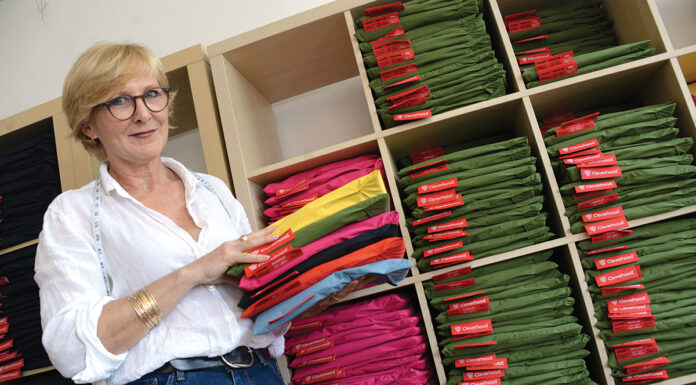
PROVIDENCE – The worst of the pandemic appears to be over, but skyrocketing operating costs have small businesses still struggling.
This was one finding of a Goldman Sachs survey published on Wednesday. The survey of graduates of its 10,000 Small Businesses program suggested that more than eight in ten small-business owners are facing increased production, shipping and general operating costs.
Susan Mocarski, owner of Providence-based rainwear apparel company Cleverhood LLC and a graduate of the 10,000 Small Businesses program at the Community College of Rhode Island, was among those with sticker shock after seeing the cost to make and ship her specialty rain capes following the pandemic. After successfully reinventing her business during the pandemic – expanding what was once a domestically made and sold product into foreign markets – she felt she could survive anything.
But as other retailers and apparel-makers re-entered the market in recent months, she was thrown for another loop with “nightmarish” import, production and shipping expenses.
“It feels like I am a skateboarder and now I am surfing,” Mocarski said.
Although the prices of her rain ponchos are based on those operating costs, she has not yet upped the price for consumers. But she knew she couldn’t absorb the loss on her own much longer.
According to Goldman Sachs’ survey, 48% of small businesses have already raised their prices to cover rising operating expenses.
Mocarski also worried that higher prices would cost her customers who didn’t want to pay more, creating the same problem of shorting her bottom line.
She was also contemplating ways to cut production costs, making lighter jackets with fewer specialty features, for instance.
Adding to the challenge is delays in both production and shipping. An order that would have once taken six weeks for one of the Detroit “cut and sew” manufacturers that makes her products to complete now is going to be a nearly year-long turnaround, she said.
Still, Mocarski was optimistic, a sentiment shared by the small-business owners surveyed. She credited support through the federal Paycheck Protection Program as well as expertise from R.I. Commerce Corp. and the John H. Chafee Center for International Business at Bryant University for helping her strengthen her exporting program during the pandemic.
Other findings from the survey include:
- 71% of small businesses are currently hiring, yet 81% of them are finding it hard to recruit qualified candidates;
- 82% of small-business owners who received a second round of funding through the Paycheck Protection Program expect to run out of funds by the end of July, and only a quarter think they can cover payroll costs on their own after that;
- Nearly all small-business owners want federal, state and local governments to prioritize and increase contracts and procurement opportunities for small businesses.
The survey reflects answers from 857 Goldman Sachs 10,000 Small Businesses program participation across 46 states. Over half of the respondents were women business owners.
Nancy Lavin is a PBN staff writer. You may reach her at Lavin@PBN.com.












